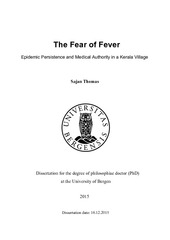| dc.description.abstract | This thesis examines the socio-medical order that formed around epidemic fevers in Kerala following the chikungunya and H1N1 outbreaks between 2007 and 2009. I study its political interfaces, embodied aspects, implications for medical authority, and state responses. My aim is to explore the trajectories through which the fear of epidemic fevers unleashed a pan- Kerala social anxiety and triggered a change in the way physicians and the government-run medical institutions function at the grassroots level. In this regard, I carried out an ethnographic mapping of the post-epidemic situation in a central Kerala village named Keranad. The fieldwork was conducted over fifteen months between 2009 and 2013. I chose to focus my research on the public healthcare system, as it constituted the linchpin for the management of epidemic fevers. Such a focus enabled me to delineate the changing ways in which the Kerala state relates to its population through the institution of medicine. The thesis basically deals with what is happening to the Primary Healthcare Centers (PHCs) following the epidemic crisis in Kerala, instigated by the large-scale outbreaks of chikungunya in 2007 and H1N1 in 2009. My central anthropological investigation revolves around the problem of the continual persistence of chikungunya, all through the post-outbreak period. Chikungunya outbreaks are more or less a closed chapter now, but they continue to remain, to be reproduced and reinvented in Kerala through processes that are not strictly medical in their character. This continual socio-cultural reproduction is not just due to the persistence of chikungunya symptoms among those affected during the initial outbreak phase. It is, rather, emergent from the relationships that stretch between the persisting chikungunya disease and the organization and exercise of medical power. Of special interest to me is how chikungunya persisted among those affected – even five years after its outbreak – and the various ways in which people understand and interpret their experiences. Through the technique of participant observation, I studied the crisis and reinvention of medical authority against the backdrop of persisting chikungunya. | en_US |
